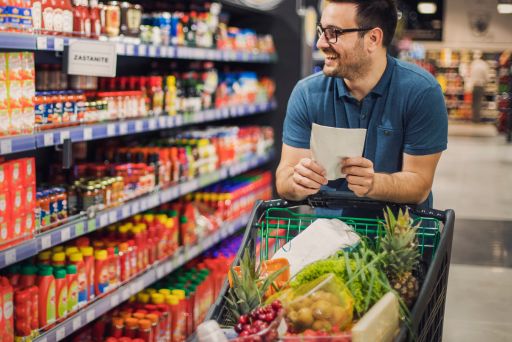Tax season often brings a myriad of questions, especially for self employed individuals and small businesses trying to maximize their tax deductions. One common query is, “Are groceries tax deductible?” This question isn’t straightforward and depends heavily on the context of the purchase. Understanding the Internal Revenue Service (IRS) rules and regulations can help clarify when grocery items might qualify as a legitimate business expense and when they fall under personal expenses.

What is a Tax Deduction?
A tax deduction is an expense that can be subtracted from your taxable income, reducing the amount of income subject to tax. This, in turn, lowers your overall tax liability. Claiming tax deductions correctly can lead to significant savings at tax time.
What Constitutes a Personal Expense?
A personal expense is any cost incurred for personal, rather than business, reasons. This includes grocery items bought for personal use, personal life activities, and other non-business related expenses. The IRS does not allow these costs to be deducted from your taxable income.
When Are Groceries Considered a Business Expense?
Business Meals and Entertainment Expenses
Business meals are one scenario where food expenses might be deductible. If you’re entertaining clients or having a meal for business purposes, these costs can be deductible, provided they meet the IRS’s criteria:
- The expense must be directly related to the active conduct of your business.
- The food and beverages must not be lavish or extravagant.
Specific Industries
Certain professions, such as food bloggers or those in the food industry, may have a more compelling case for deducting groceries as a business expense. For example, food bloggers who purchase food items for the specific purpose of preparing food to review or feature in their content might be able to claim these costs as business related expenses.
Business Purposes for Self Employed Individuals
For self employed individuals and business owners, grocery receipts can sometimes be a tax write off if:
- The groceries are used to prepare meals for business meetings.
- The food is part of a business meal where clients or employees are present.
- The groceries are used in the course of conducting business related food demonstrations or catering services.
Specific Scenarios and Exceptions
Travel and Business Meetings
When traveling for business purposes, the cost of meals, including groceries if you’re staying in accommodations where you can prepare your own food, might be deductible. This is often the case when staying in a hotel room equipped with a kitchenette.
Health and Medical Expenses
In some cases, if groceries are prescribed as part of a specific medical treatment, they might be partially deductible under medical expenses. However, this is rare and typically requires detailed documentation.
Home Office Deduction
If you operate a business from home and use part of your home exclusively for business, you might qualify for a home office deduction. However, grocery items purchased for personal consumption are not deductible, even if consumed while working in your home office.

Importance of Detailed Records
Keeping Grocery Receipts
Maintaining detailed records is crucial for claiming tax deductions related to groceries. This includes keeping grocery receipts and documenting the business purpose of the purchase. Without proper documentation, the IRS may disallow the deduction, leading to potential issues during an audit.
Certified Public Accountant Guidance
Consulting with a certified public accountant (CPA) or tax expert can help ensure you’re correctly identifying and documenting deductible expenses. They can provide personalized advice based on your specific business activities and tax situation.
Examples of Non-Deductible Grocery Expenses
Personal Use and Life
Personal expenses, such as groceries purchased for your family or personal consumption, are not deductible. This includes regular household grocery shopping.
Entertainment Expenses
While some entertainment expenses may be partially deductible if they serve a business purpose, groceries bought for personal enjoyment or non-business related events are not deductible.
Strategies for Business Owners
Proper Classification of Expenses
Business owners should ensure they properly classify their expenses to maximize tax benefits. For example, differentiating between business meals and personal meals can impact your taxable income.
Utilizing the Actual Expense Method
Using the actual expense method allows self employed individuals to deduct the exact amount spent on business related expenses, provided they have detailed records. This can be more advantageous than using a standard deduction.

Conclusion
While the question, “Are groceries tax deductible?” might not have a simple yes or no answer, understanding the IRS guidelines and the context of your purchases can help determine if they qualify as a legitimate business expense. Keeping detailed records, consulting with a certified public accountant, and clearly differentiating between personal expenses and business expenses are essential steps in claiming tax deductions accurately. By doing so, business owners and self employed individuals can potentially reduce their taxable income and tax liability, ultimately saving money at tax time.
FAQs: Are Groceries Tax Deductible?
1. Can I deduct groceries bought for my business meetings?
Answer: Yes, groceries can be deducted as a business expense if they are used for business meetings. To qualify, the expenses must be directly related to the active conduct of your business, and the food and beverages should not be lavish or extravagant. Proper documentation, such as grocery receipts and records of the business purpose, is essential for claiming these deductions.
2. Are groceries deductible for food bloggers or those in the food industry?
Answer: For food bloggers and professionals in the food industry, groceries purchased specifically for creating content, reviewing, or demonstrating food items can be considered a legitimate business expense. To deduct these costs, detailed records and receipts must be kept to show the business purpose of the groceries.
3. What is the difference between personal and business grocery expenses?
Answer: Personal expenses refer to groceries bought for personal use, such as household consumption, and cannot be deducted. Business expenses, on the other hand, include groceries used for business purposes, such as client meals, business meetings, or creating content for a food blog. It is crucial to keep detailed records to differentiate and substantiate these expenses to the IRS.
4. How can I keep track of deductible grocery expenses?
Answer: To keep track of deductible grocery expenses, maintain detailed records including grocery receipts, notes on the business purpose of the purchase, and any relevant documentation. Consulting with a certified public accountant (CPA) or tax expert can help ensure that you correctly document and classify these expenses for tax deductions.
5. Are there any scenarios where personal groceries can be partially deductible?
Answer: In rare cases, personal groceries might be partially deductible under medical expenses if they are prescribed as part of a specific medical treatment. However, this requires detailed documentation and is not common. Additionally, groceries used while traveling for business purposes and preparing meals in a hotel room may also qualify, provided the travel is for legitimate business activities and is properly documented.

